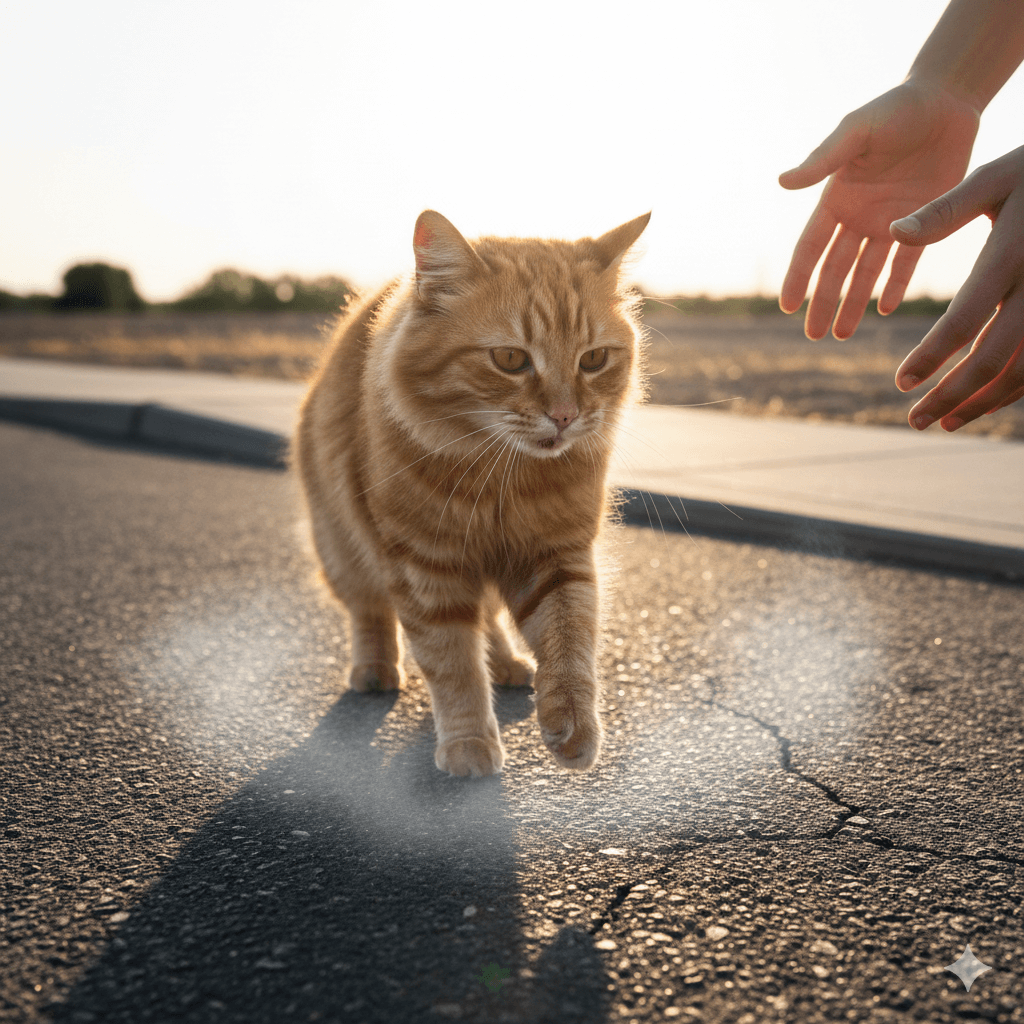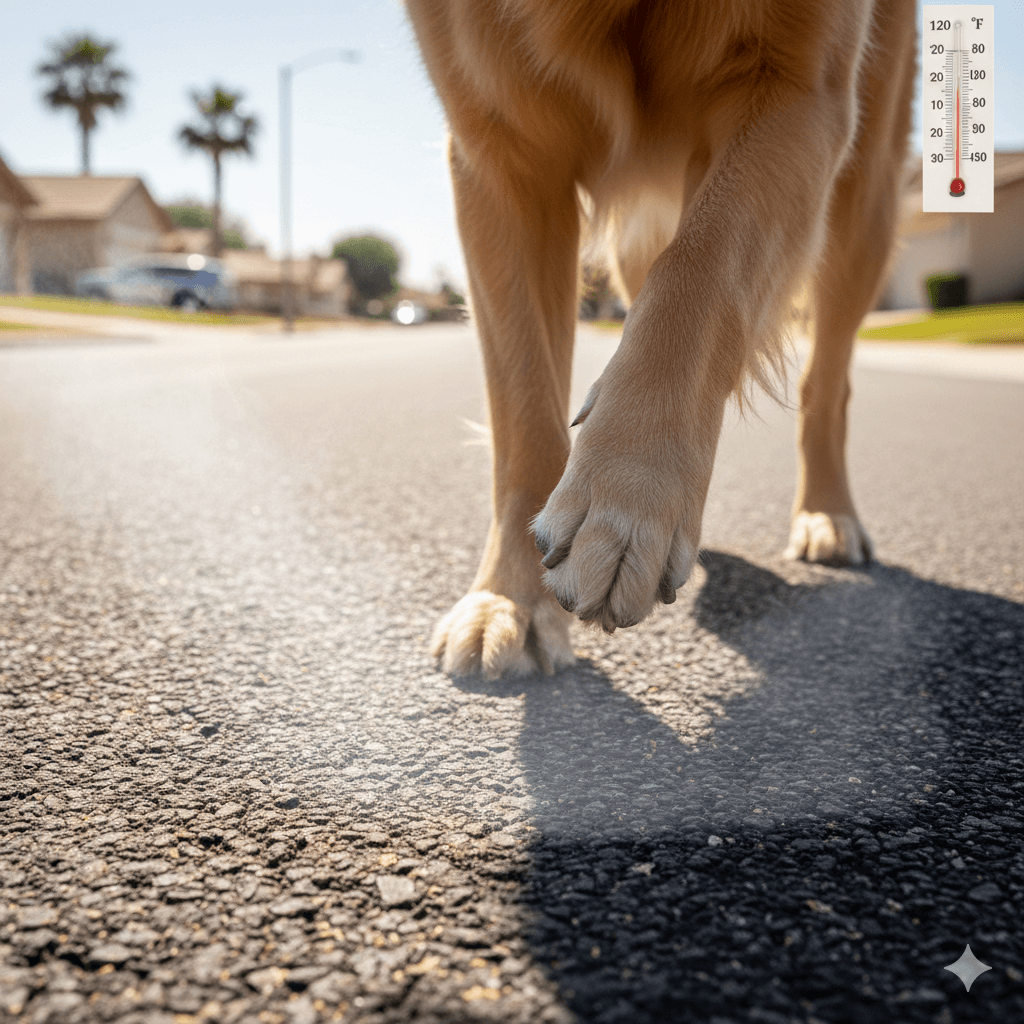Is Royal Canin Good Cat Food? A Deep Dive into Tailored Feline Nutrition
Choosing the right food for your feline friend is one of the most important decisions you make as a pet parent. With countless brands vying for your attention, it’s natural to ask: is Royal Canin good cat food? Known globally for its highly specialized formulas, Royal Canin has carved out a significant niche in the pet nutrition market. Let’s embark on a detailed exploration to understand its unique approach to feline dietary needs, evaluating its strengths, philosophies, and how it measures up for your cherished companion.
The Royal Canin Philosophy: Science-Backed, Breed-Specific, and Life-Stage Focused
At the heart of answering “is Royal Canin good cat food?” lies its foundational philosophy. Unlike many brands that focus primarily on ingredient lists as their main selling point, Royal Canin emphasizes a science-backed approach. Their core belief is that nutrition should be precisely tailored to a cat’s individual needs, which can vary dramatically based on breed, age, lifestyle, and specific health concerns. This commitment to targeted nutrition drives their extensive research and development.
Here’s a closer look at the core tenets of the Royal Canin philosophy:
Nutritional Precision: Royal Canin’s primary focus is on the precise balance of nutrients (proteins, fats, carbohydrates, vitamins, minerals) rather than simply named ingredients. They believe that providing the correct nutrient profile for a specific cat is more important than marketing buzzwords, aiming for optimal digestibility and bioavailability.
Breed-Specific Formulas: A unique aspect of Royal Canin is its development of diets tailored for specific cat breeds. These formulas consider a breed’s unique jaw structure, coat type, predispositions to certain health issues, and even typical behaviors. For instance, a Maine Coon might need larger kibble and joint support, while a Persian might benefit from kibble shape for brachycephalic jaws and skin/coat care.
Life-Stage and Lifestyle Diets: Recognizing that a kitten’s needs differ vastly from a senior cat’s, and an indoor cat’s from an active outdoor cat’s, Royal Canin offers extensive ranges for different life stages (kitten, adult, senior) and lifestyles (indoor, outdoor, spayed/neutered). This ensures nutrient levels are appropriate for their energy output and metabolic changes.
Veterinary Therapeutic Diets: A significant portion of Royal Canin’s research goes into its veterinary prescription diets. These diets are formulated to help manage specific health conditions such as urinary issues, kidney disease, gastrointestinal sensitivities, or weight management, and are available only through veterinary recommendation. This deep clinical expertise underpins their entire range.
Research and Development: Royal Canin invests heavily in scientific research, collaborating with veterinarians, nutritionists, and breeders worldwide. This scientific rigor aims to understand feline physiology and health challenges to develop highly targeted nutritional solutions.
This highly specialized and scientific philosophy sets Royal Canin apart, aiming to provide not just food, but precise nutritional solutions designed for the unique biological makeup of each cat.
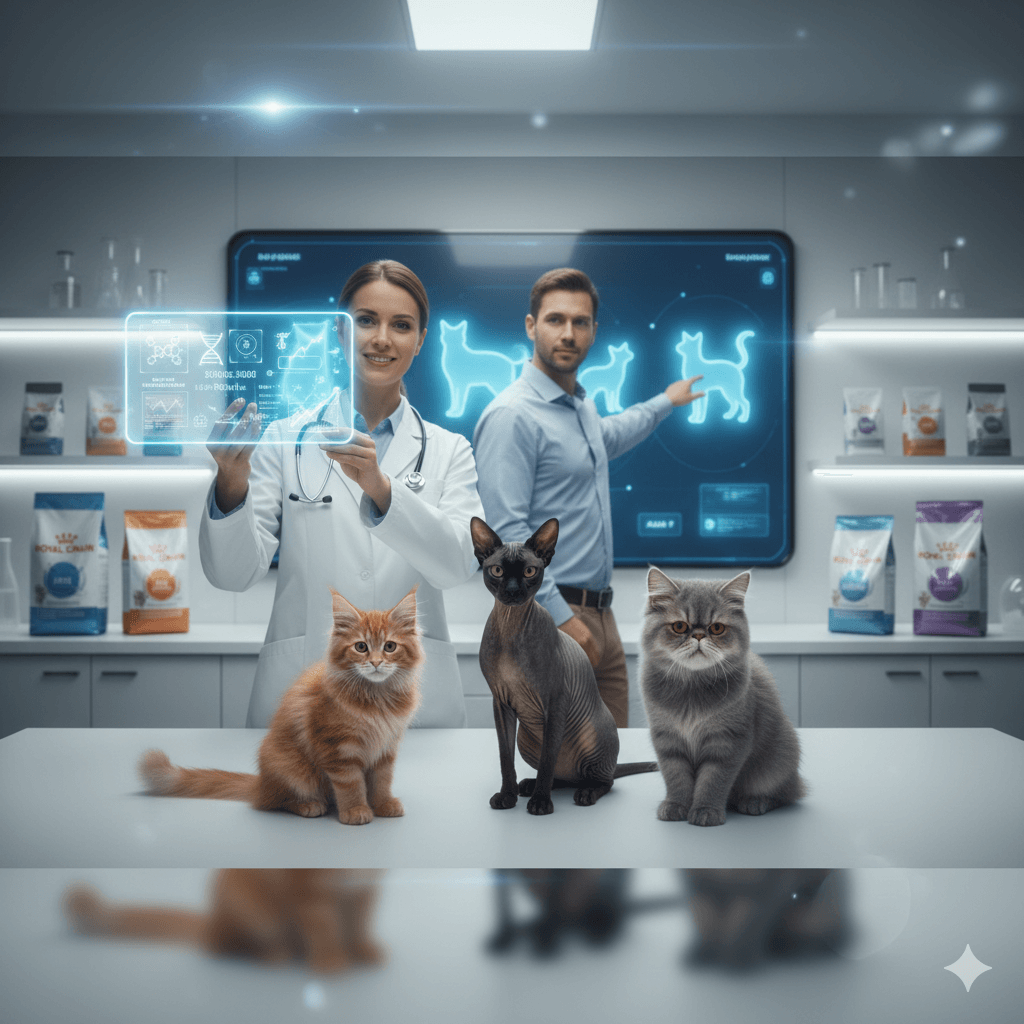
Key Ingredients & Nutritional Profile: What’s Inside Royal Canin?
When evaluating is Royal Canin good cat food, understanding its ingredient philosophy and nutritional profile is crucial. Royal Canin often comes under scrutiny for its ingredient list, which may feature corn, wheat, or by-products—ingredients that some perceive as “fillers” or less desirable. However, their argument is that these ingredients are selected for their specific nutrient contribution and digestibility, supporting the overall nutritional balance rather than being chosen purely for their raw form.
Let’s delve into their ingredient and nutritional approach:
Targeted Protein Sources: Royal Canin utilizes various protein sources, including chicken meal, pork meal, and sometimes plant-based proteins, chosen for their digestibility and amino acid profiles, which are crucial for muscle maintenance and overall health. The specific protein content varies widely across their specialized formulas to meet different needs.
Carbohydrates for Energy: Ingredients like corn, wheat, rice, and barley are common carbohydrate sources. Royal Canin asserts these are highly digestible and provide essential energy. They are often finely ground and processed to optimize digestibility and nutrient absorption.
Fats for Energy and Health: Animal fats (like chicken fat) and vegetable oils (like soy oil) are included for concentrated energy, essential fatty acids (Omega-3 and Omega-6), and to enhance palatability. These fatty acids are vital for skin and coat health, as well as cognitive function.
Vitamins and Minerals: Every Royal Canin formula is meticulously fortified with a precise blend of vitamins, minerals, and trace elements to ensure complete and balanced nutrition, tailored to the specific life stage, breed, or health condition the diet is designed for.
Digestibility Enhancers: Ingredients like beet pulp are often included for their fiber content, which supports digestive health and can aid in hairball control. Prebiotics may also be added to promote a healthy gut microbiome.
By-Product Meals: Royal Canin frequently uses “by-product meals” (e.g., chicken by-product meal). They clarify that these are not generic “fillers” but processed animal parts (organs, bone, connective tissue) that are rich in highly digestible protein, essential amino acids, vitamins, and minerals. They argue these are valuable and nutritious sources, distinct from low-quality, undifferentiated “by-products.”
The brand’s approach emphasizes the scientific composition and nutrient delivery over a simplistic “named ingredients first” philosophy. They prioritize how the body utilizes the nutrients, arguing that a highly digestible by-product meal might offer superior nutrition to a less digestible whole meat in certain contexts.

Check this guide 👉Blue Buffalo Cat Food: Best 7 Expert Tips!
Check this guide 👉Understanding Cat Food Calories: Best 7 Expert Tips!
Check this guide 👉Understanding Cat Food Calories: Best 7 Expert Tips!
| Advantages of Royal Canin | Potential Considerations |
|---|---|
| Breed-specific formulas designed for unique anatomical needs (e.g., Persian, Maine Coon) | Some formulas contain corn, wheat, or by-products, which may not suit cats with sensitivities |
| Veterinary-formulated diets for specific health conditions (kidney, urinary, weight management) | Higher price point compared to many mainstream brands |
| Scientifically researched nutrient profiles tailored to life stage and activity level | Carbohydrate content may be higher than ideal for obligate carnivores in some formulas |
| Highly palatable textures and kibble shapes that encourage eating in picky or senior cats | Limited transparency on sourcing of some ingredients compared to premium holistic brands |
| Extensive clinical testing and partnerships with veterinary professionals worldwide | Not all formulas are grain-free or low-carb—check labels carefully for your cat’s needs |
Breed-Specific Diets: A Royal Canin Innovation
One of Royal Canin’s most recognizable and debated innovations in the pet food industry is its extensive line of breed-specific diets. This approach is central to understanding is Royal Canin good cat food for owners looking for highly customized nutrition. The premise is that each cat breed has unique characteristics—from jaw structure and coat type to predispositions for certain health issues and even differences in grooming habits—that can be addressed through tailored kibble design and nutrient profiles.
This targeted approach offers several potential benefits:
Optimized Kibble Shape and Size: For breeds like Persians with their flat faces (brachycephalic), kibble is often shaped to be easier to pick up and chew, encouraging proper mastication and reducing food waste. Conversely, a Maine Coon might get larger kibble to encourage thorough chewing.
Coat and Skin Health Support: Breeds with long, dense coats (e.g., Persian, Maine Coon) often have formulas enriched with specific nutrients like Omega-3 and Omega-6 fatty acids, B vitamins, and amino acids to support skin barrier function and coat luster, helping to reduce shedding and maintain hair quality.
Urinary Health Support: Some breeds are statistically more prone to certain urinary issues. Breed-specific diets may incorporate controlled mineral levels to help maintain a healthy urinary pH, reducing the risk of crystal formation.
Digestive Sensitivity: Certain breeds might have more sensitive digestive systems. These diets can include highly digestible proteins and specific fibers to support gastrointestinal health and promote optimal stool quality.
Joint and Bone Support: Larger or more active breeds might have formulas with glucosamine and chondroitin, or specific mineral balances, to support joint health and bone structure throughout their lives.
Dental Health: The texture, shape, and size of the kibble can be designed to encourage chewing, which helps to mechanically clean the teeth and reduce tartar buildup for specific breeds.
While not every cat owner believes in the necessity of breed-specific diets (some argue a high-quality general diet is sufficient), Royal Canin’s detailed research into the specific morphological and physiological needs of different breeds highlights their commitment to a highly individualized approach to feline nutrition. This level of customization is a key differentiator in their market positioning.
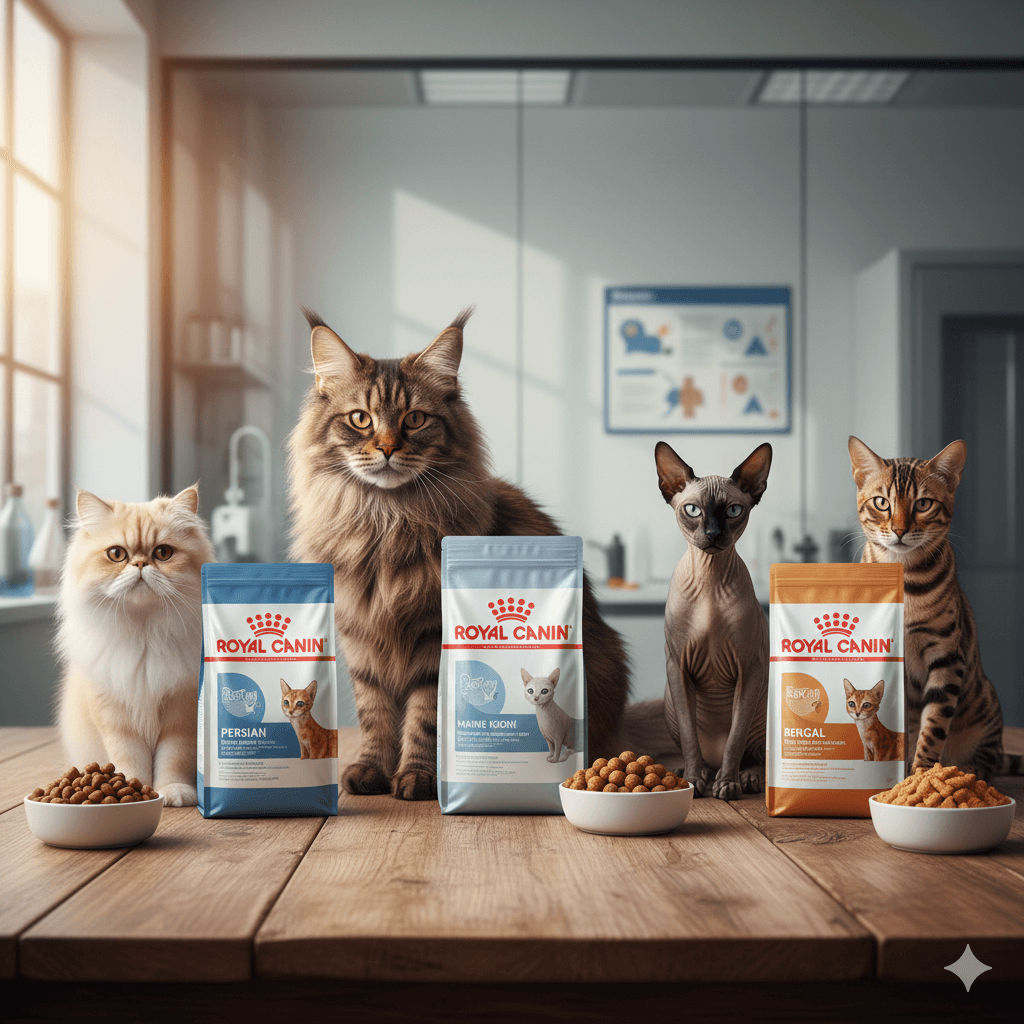
Veterinary Exclusive Diets: Clinical Nutrition for Specific Conditions
Beyond their retail offerings, a significant part of what answers “is Royal Canin good cat food” for many veterinary professionals is their extensive range of veterinary exclusive therapeutic diets. These are specialized formulas developed with clinical research and are designed to manage or support cats with specific diagnosed health conditions. They are available only through veterinary prescription, underscoring their medical purpose and scientific backing.
These prescription diets are formulated to address a wide array of feline health challenges:
Urinary Health: Diets formulated to dissolve specific types of urinary stones (e.g., struvite) or to prevent their recurrence, by controlling mineral levels (magnesium, phosphorus) and promoting a healthy urinary pH. This is critical for cats prone to Feline Lower Urinary Tract Disease (FLUTD).
Kidney Health: For cats with chronic kidney disease, these diets are designed to reduce the workload on the kidneys by carefully controlling protein, phosphorus, and sodium levels, while providing essential fatty acids to support kidney function.
Gastrointestinal Health: Highly digestible formulas with specific fiber blends and prebiotics/probiotics for cats with sensitive stomachs, inflammatory bowel disease, or acute digestive upset. These diets aim to minimize digestive strain and support nutrient absorption.
Weight Management: Low-calorie, high-fiber, and high-protein diets designed to promote safe and effective weight loss in obese or overweight cats, while ensuring they feel full and maintain muscle mass.
Dermatology/Allergies: Limited ingredient diets or hydrolyzed protein diets for cats with food allergies or intolerances, as well as formulas rich in skin-supporting nutrients for conditions like dermatitis or excessive shedding.
Diabetes Management: Diets with controlled carbohydrate levels and high protein to help regulate blood glucose levels in diabetic cats.
Mobility Support: Formulas containing ingredients like glucosamine, chondroitin, and Omega-3 fatty acids to support joint health in cats suffering from arthritis or other mobility issues.
The development of these therapeutic diets requires extensive research, rigorous testing, and collaboration with veterinary specialists. For many vets, the efficacy and proven results of these diets in a clinical setting are a strong testament to Royal Canin’s commitment to feline health and their ability to produce truly specialized nutrition, reinforcing the idea that is Royal Canin good cat food when targeted solutions are needed.
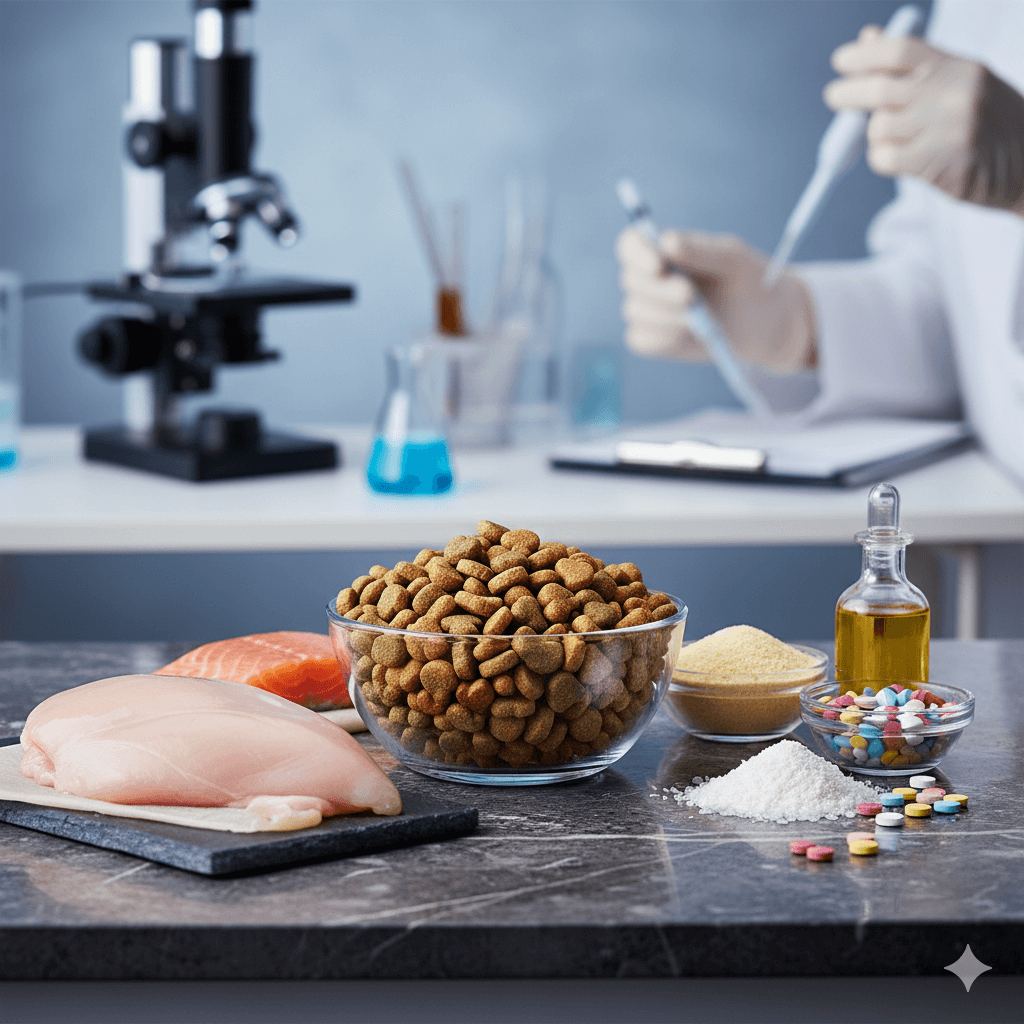
Assessing Royal Canin’s Value: Price vs. Precision
When deciding is Royal Canin good cat food for your pet, the aspect of value often comes into play. Royal Canin products typically sit at a higher price point compared to many mainstream or budget brands. This premium pricing reflects their significant investment in research, specialized formulations, breed-specific approaches, and the quality control associated with precise nutrient delivery. The value proposition, therefore, shifts from simply “cost per bag” to “cost for targeted health benefits.”
Here’s how to assess the value:
Specialization Justifies Cost: For cats with specific breed needs or diagnosed health conditions, the specialized formulation can often prevent or mitigate more expensive veterinary treatments in the long run. The precision of the diet is designed to offer a solution where generic foods might fall short.
Research & Quality Control: A portion of the higher cost goes towards Royal Canin’s extensive research and development, as well as rigorous quality control measures. This aims to ensure consistency in nutrient delivery and food safety, which adds inherent value.
Digestibility and Absorption: Royal Canin often emphasizes the high digestibility of its ingredients. If a cat absorbs more nutrients from its food, it may require smaller portions, potentially making the cost-per-feeding more comparable to cheaper, less digestible alternatives.
Longevity and Quality of Life: The argument for value also extends to the potential for a longer, healthier life for your cat. If a specialized diet helps manage a chronic condition effectively, the improved quality of life for the cat and reduced stress for the owner are invaluable.
Ingredient Perception vs. Nutritional Outcome: While some cheaper brands might boast “human-grade” ingredients or “grain-free” labels, Royal Canin counters that the nutritional outcome (i.e., how the cat’s body uses the nutrients) is more important than the raw ingredient list. They argue their scientific formulation provides superior outcome-based value.
Veterinary Recommendation: For many pet owners, a veterinarian’s recommendation for a Royal Canin therapeutic diet provides significant value and trust, as it’s seen as a medically supported decision for their pet’s health.
Ultimately, whether the higher price point represents “good value” depends on your cat’s specific needs and your priorities as an owner. For those seeking highly targeted nutritional solutions, especially for health management or breed-specific traits, the investment in Royal Canin is often viewed as justified by the benefits.
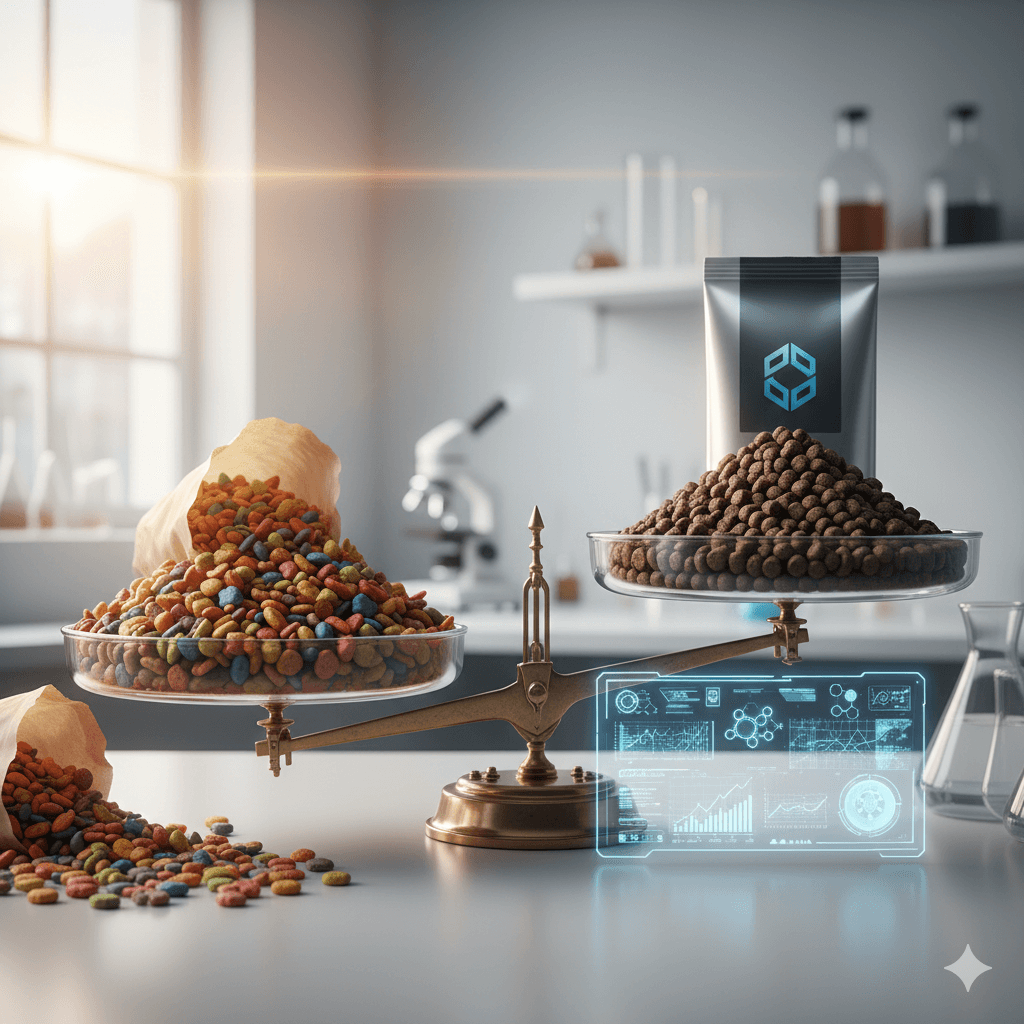
Pros and Cons of Royal Canin Cat Food: A Balanced Perspective
To comprehensively answer is Royal Canin good cat food, it’s helpful to weigh the brand’s advantages against its potential drawbacks. Like any major pet food brand, Royal Canin has its strengths and weaknesses, and what makes it “good” often depends on individual cat needs and owner philosophies.
Here’s a balanced look at the pros and cons:
Pros:
Highly Specialized Formulas: Their biggest strength is the vast array of diets tailored for specific breeds, life stages, lifestyles, and medical conditions (veterinary diets). This precision is unmatched by many competitors.
Extensive Scientific Research: Royal Canin invests heavily in R&D, collaborating with vets and nutritionists. This scientific backing ensures formulas are designed for specific physiological needs.
High Digestibility: Many owners and vets report that Royal Canin diets are highly digestible, leading to good stool quality and fewer digestive upsets, especially with their gastrointestinal formulas.
Consistent Quality: The brand is known for rigorous quality control and consistent product formulation, which is reassuring for pet owners.
Veterinary Endorsement: A significant number of veterinarians recommend Royal Canin, particularly their prescription diets, due to their proven efficacy in managing specific health issues.
Palatability: Despite criticisms of ingredients, many cats find Royal Canin diets palatable, which is crucial for compliance, especially with therapeutic foods.
Cons:
Ingredient List Controversy: The use of corn, wheat, soy, and by-product meals is a frequent point of criticism from owners who prefer “human-grade,” “whole ingredient,” or grain-free diets.
Cost: Royal Canin is often more expensive than many other brands, which can be a barrier for some pet owners.
Protein Sources: Some formulas may contain less “whole meat” as the first ingredient compared to brands emphasizing meat-first diets, relying more on meals and by-products.
Less Emphasis on “Natural” Marketing: For owners prioritizing a “natural” or “ancestral” diet aesthetic, Royal Canin’s science-first approach might seem less appealing.
Potential for Over-Specialization: While specialization is a strength, some argue that it can lead to unnecessary complexity or that a high-quality, simpler diet could serve many cats just as well.
Ultimately, a cat’s individual health, response to the food, and a veterinarian’s recommendation are the most crucial factors in determining if Royal Canin is a good choice.
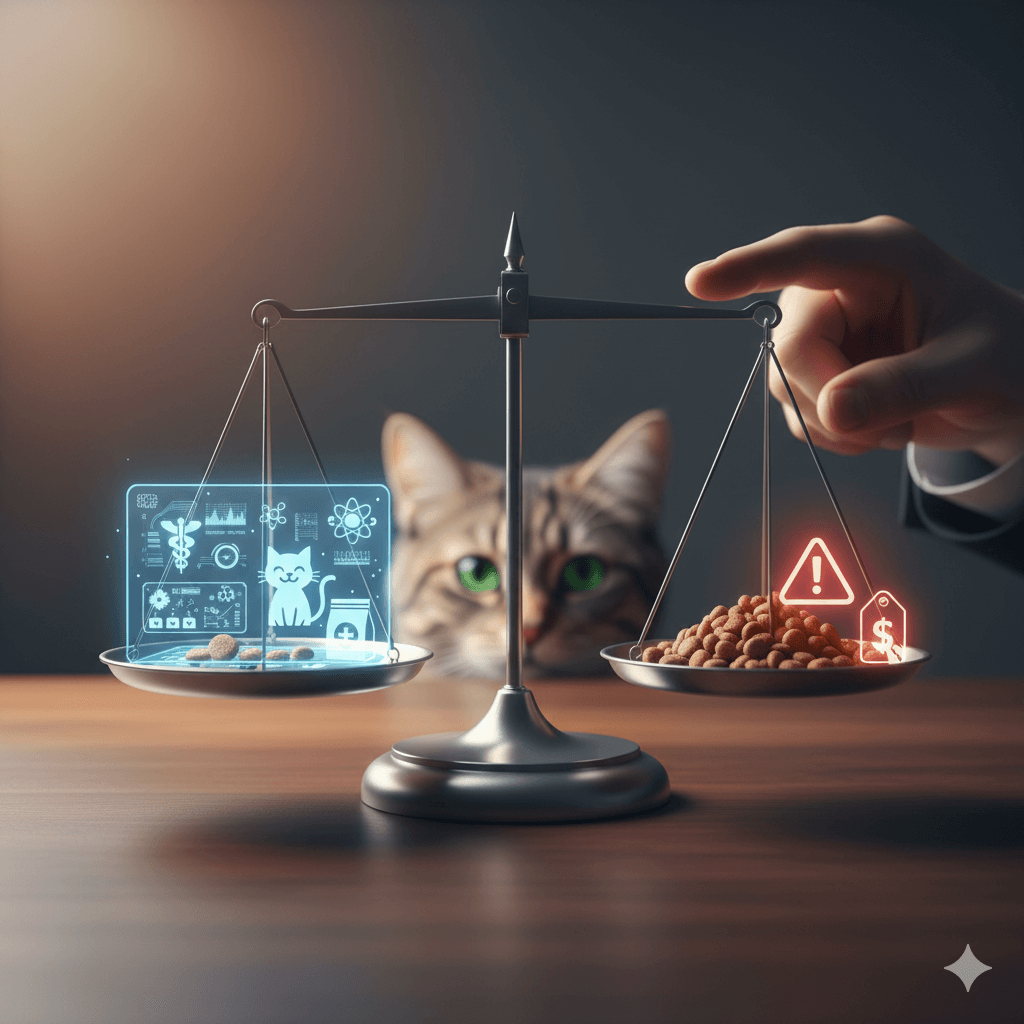
Addressing Common Criticisms: Royal Canin’s Defense
When asking is Royal Canin good cat food, it’s impossible to ignore the criticisms that often arise, particularly concerning its ingredient list. Brands that prioritize “human-grade” or “whole meat first” ingredients have gained popularity, leading to questions about Royal Canin’s use of ingredients like corn, wheat, and by-product meals. However, Royal Canin has consistently offered a scientific defense for its choices.
Here’s a look at the common criticisms and Royal Canin’s counter-arguments:
Criticism: Use of Grains (Corn, Wheat, Soy)
Defense: Royal Canin argues that grains like corn, wheat, and rice are not inherently “fillers” or harmful to cats without a specific allergy. They state that these are highly digestible carbohydrate sources when properly processed, providing essential energy and aiding in the precise nutrient balance required for specific formulas. They maintain that true grain allergies in cats are rare.
Criticism: Use of By-Product Meals
Defense: Royal Canin clarifies that “by-product meals” (e.g., chicken by-product meal) are distinct from generic “animal by-products.” These meals are rendered, ground, and highly digestible sources of protein, essential amino acids, vitamins, and minerals derived from clean parts of slaughtered animals (like organs, bone, connective tissue, not feathers or hooves). They argue these are valuable, nutritious, and sustainable protein sources, often richer in certain nutrients than muscle meat alone.
Criticism: “Meat Is Not the First Ingredient”
Defense: Royal Canin’s philosophy centers on nutrient analysis, not just ingredient order by weight. They emphasize that the total nutrient profile (percentage of protein, fat, carbohydrates, and micronutrients) delivered to the cat is paramount. While they use animal proteins, their focus is on providing optimal amino acid profiles, which can be achieved through various highly digestible protein sources, including by-product meals. The order of ingredients on a label can be misleading, as water-heavy whole meats weigh more pre-processing.
Criticism: Artificial Preservatives/Additives
Defense: Royal Canin states that they use safe and approved preservatives and antioxidants to maintain the freshness and nutritional integrity of their diets. They adhere to strict food safety standards and regulations in the countries where their products are sold.
Royal Canin maintains that their ingredient choices are driven by scientific research into feline physiology and nutrient bioavailability, aiming for optimal health outcomes rather than marketing trends. Their defense hinges on the efficacy of their formulas, particularly in clinical settings, to provide targeted nutrition for specific needs.

FAQ: Common Questions About Royal Canin Cat Food
Is Royal Canin good cat food for all cats?
Royal Canin aims to be good for cats by offering highly specialized nutrition. While a specific formula might be excellent for one cat (e.g., a Persian needing a certain kibble shape or a cat with kidney disease needing a therapeutic diet), a generic formula might not be the “best” for every single cat. Its strength lies in its ability to target specific needs.
Why do veterinarians recommend Royal Canin?
Veterinarians often recommend Royal Canin due to its extensive scientific research, rigorous quality control, and the proven efficacy of its therapeutic diets in managing specific health conditions. Its focus on precise nutrient profiles, rather than just ingredient lists, aligns with a medical approach to nutrition.
Is Royal Canin a high-quality cat food?
Royal Canin is considered a high-quality cat food by many experts and veterinary professionals, particularly for its scientific formulation and ability to address specific dietary needs. While its ingredient list (e.g., use of grains or by-product meals) is debated by some, its nutritional precision and consistent results in supporting feline health are widely recognized.
Is Royal Canin grain-free?
No, Royal Canin is not primarily a grain-free brand. Many of their formulas contain grains like corn, wheat, or rice, which they include as digestible sources of carbohydrates and nutrients. They do not advocate for grain-free diets unless a specific grain allergy is diagnosed.
Why is Royal Canin so expensive?
The higher price point of Royal Canin is attributed to its significant investment in scientific research and development, the precise formulation of highly specialized diets (including breed-specific and therapeutic options), and rigorous quality control measures to ensure consistent nutrient delivery and safety.
The Right Choice for Your Cat: A Concluding Thought
Ultimately, the question “is Royal Canin good cat food?” doesn’t have a universal yes or no answer, but rather a nuanced one tailored to each cat. For owners seeking a scientific, precisely formulated diet that addresses specific breed characteristics, life stages, or medical conditions, Royal Canin stands out as a strong contender. Its commitment to extensive research, high digestibility, and veterinary-backed therapeutic diets offers a unique value proposition.
While its ingredient philosophy may differ from “natural-first” brands, its focus on nutritional outcomes is highly regarded by many professionals. By consulting your veterinarian and considering your cat’s individual needs, you can determine if Royal Canin is indeed the optimal choice to support their long-term health and vitality.
Newfoundland Dog Personality: Best 7 Expert Tips! – Discover the gentle, loyal, and protective nature of this giant breed perfect for families.
Can Hot Pavement Burn Your Cats Paws? Best 7 Expert Tips! – Learn how to protect your cat’s paws from hot surfaces and prevent painful burns this summer.
Can Hot Pavement Burn Your Dogs Paws? Best 7 Expert Tips! – Learn how to protect your dog’s paws from hot surfaces and ensure safe summer walks.
Irish Wolfhound Size: Best 7 Expert Tips! – Discover the ideal height, weight, and care tips for this majestic giant breed. Learn how to manage their impressive stature responsibly.


